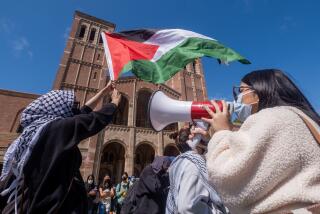Iraqis Attuned to Upcoming Election -- for U.S. President
- Share via
BAGHDAD — With Iraq’s elections just three months away, it’s little surprise that talk at the bustling Al Mutanabi book market turned recently to the upcoming vote.
A group of book-browsing intellectuals sparred over which leader they thought would be best for the future of their country and who would fight hardest to end terrorism. It was exactly the kind of robust dialogue one would hope to find in a budding democracy.
But the intellectuals were debating the U.S. election, not their own.
There’s been almost no campaigning or political discussion here on the Iraqi elections, but many citizens are paying close attention to the U.S. presidential race.
“Of course I care about the U.S. election,” said Adil Sabr Jalout, 50, a technical advisor at a state-owned steel company in the southern city of Basra. “Our future is dependent upon it.”
An October poll by the Iraq Center for Research and Strategic Studies showed that more than 45% of Iraqi respondents believed the outcome of the U.S. election would directly affect the direction of their country.
But if a recent poll and a sampling of interviews with Iraqis around the country are any indication, neither President George Bush nor Sen. John F. Kerry is particularly popular.
The poll found that 21% of Iraqis prefer Kerry and 17% like Bush, a difference that is within the survey’s margin of error.
The majority of nearly 2,000 respondents -- about 59% -- said they don’t like either candidate.
“I wouldn’t vote for either because both are useless,” said Abed Qahir Abed Aziz, 37, an attorney in the northern city of Mosul.
“Neither Bush nor Kerry can solve our problems,” said Atheer Adil, 27, an Arabic-language student in Baghdad.
Iraqis’ views about the U.S. race offer a window onto the types of issues that will likely dominate their own elections. With car bombings, assassinations and other attacks occurring nearly daily in Iraq, security tops the list.
“The most important issue is who will stop the terrorism,” said Adnan Mohammed, 58, a teacher in Kirkuk, in the country’s north.
Other priorities include unemployment, infrastructure improvements, the departure of foreign troops and housing, according to the Iraq Center’s survey. The January elections ranked sixth on the list of top issues facing Iraqis, said Sadoon Dulaimi, the director of the center.
In interviews, Iraqis disagreed about whether they thought Bush or Kerry would do a better job providing security in Iraq.
Several said they hoped Kerry would win because he might offer a fresh start and had expressed a desire to bring U.S. troops home.
“The attacks will decrease if they elect Kerry because he will reduce the presence of U.S. Army in Iraq,” said Juma Abadi Omran, 33, a merchant in Basra.
Perhaps nowhere are such sentiments stronger than in Fallouja, the restive Sunni Muslim stronghold that is bracing for a second U.S. invasion aimed at routing insurgents who have taken control of the city.
Some residents expressed hope that Kerry, if elected, would stop a planned offensive in the city.
“We hope that Kerry will come up with positive political solutions to resolve the conflicts in Iraq by ending the occupation,” said Jabeer Hussein, 57, a retired college professor in Fallouja.
“It’s time for Kerry to come and fix Bush’s mistakes by pulling out the troops so we can live in peace,” teacher Abid Abaas said.
Other Iraqis, however, said they believed Bush would be firmer against terrorists and had more experience in the Middle East.
“If Bush wins, maybe he will get tough on the terrorists,” said Khalib Ali, a retired government worker in Mahmoudiya, south of Baghdad. “Kerry might not take the job as seriously. He will never understand the situation as well as Bush. Iraq’s problems are in Bush’s hand.”
Mosul political analyst Masued Bala, 40, agreed.
“The one who started the job must finish it,” he said.
Some Iraqis credited Bush for removing Saddam Hussein from power, but the subsequent presence of U.S. troops has left a bitter taste.
“I wish that Bush will lose because he invaded our country,” said Dawod Salman Dawod, 45, a supervisor at the Basra Gas Co.
“I prefer Kerry,” said Hussein Abdulla, 41, of Baghdad’s Sadr City. “Bush reminds us of the brutal war we just witnessed.”
Others worried that a victory for Kerry would further delay resolution of Iraq’s problems as the new administration crafted its approach.
“We’d have to start at the very beginning, and this will take time,” said Suhail Mana, 52, a teacher in Baghdad. He noted the changes that occurred in the U.S. policy toward Israel and the Palestinians when the presidency shifted from George H.W. Bush to Bill Clinton and then to George W. Bush.
Several Iraqis questioned whether it mattered who won the American race, saying the candidates’ policies on Iraq don’t appear to vary substantially.
Baghdad artist Zahir Hashim put it this way: “I can liken them with two persons going to the same place, but each one is going on a different road.”
*
Times special correspondents Raheem Salman in Baghdad, Roaa Ahmed in Mosul, Yalman Ahmed in Kirkuk and Othman Ghanim in Basra contributed to this report.
More to Read
Get the L.A. Times Politics newsletter
Deeply reported insights into legislation, politics and policy from Sacramento, Washington and beyond. In your inbox three times per week.
You may occasionally receive promotional content from the Los Angeles Times.










